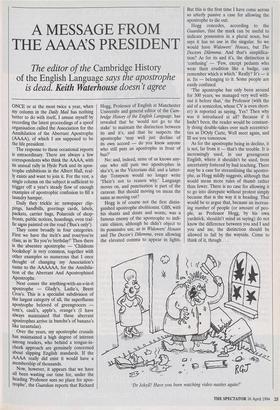A MESSAGE FROM THE AAAAS PRESIDENT
The editor of the Cambridge History of the English Language says the apostrophe
ONCE or at the most twice a year, when my column in the Daily Mail has nothing better to do with itself, I amuse myself by recording the latest proceedings of a spoof organisation called the Association for the Annihilation of the Aberrant Apostrophe (AAAA), of which I am supposed to be the life president.
The response to these occasional reports is extraordinary. There are always a few correspondents who think the AAAA, with its annual rally in Hyde Park and its apos- trophe exhibitions in the Albert Hall, real- ly exists and want to join it. For the rest, a single column on the subject is sufficient to trigger off a year's steady flow of enough examples of apostrophic confusion to fill a laundry hamper.
Daily they trickle in: newspaper clip- pings, handbills, greetings cards, labels, packets, carrier bags, Polaroids of shop- fronts, public notices, hoardings, even traf- fic signs painted on the road (93us's only').
They come broadly in four categories. First we have the its/it's and your/you're class, as in 'Its you're birthday!' Then there is the absentee apostrophe — `Childrens bookshop' is very common, together with other examples so numerous that I once thought of changing my Association's name to the AAAAAA, for the Annihila- tion of the Aberrant And Apostrophised Apostrophe.
Next comes the anything-with-an-s-in-it apostrophe — Glady's, Ladie's, Brent Cros's. This is a specialist subdivision of the largest category of all, the superfluous apostrophe beloved of greengrocers tom's, cauli's, apple's, orange's (I have always maintained that these aberrant apostrophes arrive in bunche's of banana's like tarantulas).
Over the years, my apostrophe crusade has maintained a high degree of interest among readers, who behind a tongue-in- cheek approach are genuinely concerned about slipping English standards. If the AAAA really did exist it would have a membership of thousands.
Now, however, it appears that we have all been wasting our time for, under the heading 'Professor sees no place for apos- trophe', the Guardian reports that Richard
Hogg, Professor of English at Manchester University and general editor of the Cam- bridge History of the English Language, has revealed that he 'would not go to the stake' to maintain the distinction between its and it's, and that he suspects the apostrophe 'may well just decline of its own accord — do you know anyone who still puts an apostrophe in front of bus?'
No: and, indeed, none of us knows any- one who still puts two apostrophes in sha'n't, as the Victorians did; and a latter- day Tennyson would no longer write `Their's not to reason why.' Language moves on, and punctuation is part of the caravan. But should moving on mean the same as moving out?
Hogg is of course not the first distin- guished apostrophe abolitionist. GBS, with his shants and donts and wonts, was a famous enemy of the apostrophe to indi- cate elision, although he didn't object to its possessive use, as in Widowers' Houses and The Doctor's Dilemma, even allowing the elevated comma to appear in lights. But this is the first time I have come across so utterly passive a case for allowing the apostrophe to die out.
Hogg concedes, according to the Guardian, that the mark can be useful to indicate possession in a plural noun, but says it has no use in the singular. So we would have Widowers' Houses, but The Doctors Dilemma. And that's simplifica- tion? As for its and it's, the distinction is `confusing' — Pew, except pedants who wear their erudition like a badge, can remember which is which.' Really? It's — it is. Its — belonging to it. Some people are easily confused.
`The apostrophe has only been around for 300 years; we managed very well with- out it before that,' the Professor (with the aid of a semicolon, whose CV is even short- er) is reported as saying. Yes? Then why was it introduced at all? Because if it hadn't been, the reader would be constant- ly doing double-takes over such eccentrici- ties as DOyly Carte, Well meet again, and Ill see you tomorrow.
As for the apostrophe being in decline, it is not, far from it — that's the trouble. It is increasingly used, in our greengrocer English, where it shouldn't be used, from uncertainty fostered by bad teaching. There may be a case for streamlining the apostro- phe, as Hogg mildly suggests, although that would mean more rules of thumb rather than fewer. There is no case for allowing it to go into disrepute without protest simply because that is the way it is heading. That would be to argue that, because an increas- ing number of people (or amount of peo- ple, as Professor Hogg, by his own yardstick, shouldn't mind us saying) do not know the difference between you and I and you and me, the distinction should be allowed to fall by the wayside. Come to think of it, though . .
`Dr Jekyll! Have you been watching video nasties again?'


























































 Previous page
Previous page